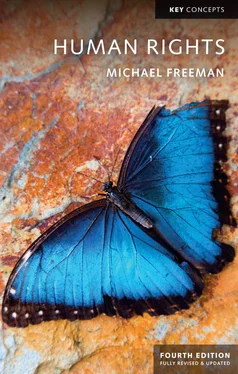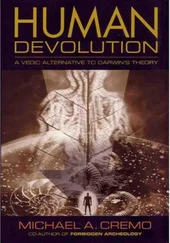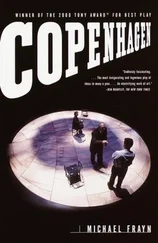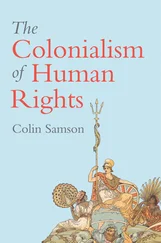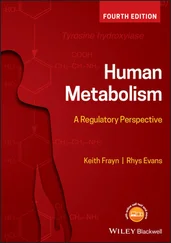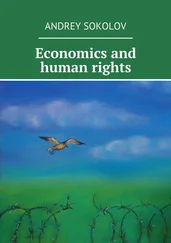The Magna Carta was later transformed from a limited political and legal agreement into a national myth. From seventeenth-century struggles against monarchical rule in England to various claims to rights for the oppressed around the world today, the myth of Magna Carta has been invoked in causes associated with civil and human rights. Eleanor Roosevelt described the UN Universal Declaration of Human Rights as ‘the international Magna Carta’ (Melton and Hazell 2015; Jones 2014).
There is no direct line from medieval conceptions of ius to early modern conceptions of rights. The humanist lawyers of the Renaissance, for example, were concerned, not with natural rights, but with civil rights (Tuck 1979). However, medieval conceptions of natural law had the most influence on the modern concept of natural rights.
In the fourteenth century William of Ockham argued that all men knew intuitively that they had a natural power to make choices. Men possessed, therefore, certain liberties that could never be alienated to church or state, and they had a natural right to the necessities of life, and to consent voluntarily to the creation of a system of laws. Positive law was required to coerce fallen men when they did not act according to their natural knowledge of what was morally right (Coleman 1993: 116–17; McGrade 1974).
In the fifteenth century, Conrad Summenhart maintained that Man had right over himself and his body. ‘Here’, Annabel Brett comments, ‘Summenhart introduces a notion of negative liberty which is very close to elements of the modern language of rights’ (Brett 2003: 42). The association of right and freedom was developed further by Spanish thinkers of the sixteenth century. Domingo de Soto, for example, held that the dignity of man was to live according to reason, for through that he was free. The political community had the right to exercise power over its members, so that each could live well, but that public right extended to the individual only as a member of the community rather than as a separate individual. Man retained his rights as an individual, and must have their exercise under his control, that is, he must be sui juris (autonomous) (Brett 2003).
The Spanish conquest of America raised important questions for Catholic theology and international politics. The debate on its legitimacy is a largely neglected moment in the history of human rights. Those who justified the conquest employed Aristotle’s doctrine of natural slavery to deny any rights to the native Americans. They were opposed by Bartolomé de Las Casas, a Dominican priest, who argued that the Indians were in all essential respects human and therefore entitled to their land and to self-government. He sought to demonstrate that the Indians had complex cultures and that the Spanish treatment of them showed that the Spanish, not the native Americans, were the barbarians. He defended the collective cultural rights of the Indians rather than the idea of individual human rights, and, in that, anticipated the modern idea of indigenous rights.
Francisco de Vitoria argued that the cities of the Mexica and the Inca proved that they were not natural slaves, but rational, and consequently had a right to their lands. The Spaniards had natural rights to trade and settle in America, preach the gospel and intervene to prevent Indian rulers from exercising tyranny over their subjects. If the Indians tried to prevent the Spanish from exercising these rights, they would commit an act of war. The Spaniards could then exercise their war rights, including plunder, enslavement, deposition of native rulers and the institution of new ones (Vitoria 1991).
The Spanish Dominicans developed the philosophy of Aquinas with a doctrine of subjective rights. Neither Vitoria nor Las Casas doubted the right of Spain to exercise sovereignty over the New World or the rightness of attempting to convert the Indians to Christianity. Only late in his life did Las Casas come to believe that it might be better for the native Americans to remain heathens, with their distinctive cultures, than to be brought to Christianity by force. The practical advocacy of Las Casas and the more academic philosophy of Vitoria provided an important link between Thomist philosophy and later theories of rights. They both showed that the concept of natural rights could be used both to condemn and to justify European imperialism (Pagden 1982; Carozza 2003).
By the beginning of the seventeenth century there were two principal traditions of thinking about rights. The first emphasized natural, subjective, individual rights. The second emphasized objective right and/or civil rights. The Dutch jurist, Hugo Grotius, was a crucial figure in transforming medieval ideas into the modern concept of rights. He held that the will of God was law, and was known through man’s sociability, which was the basis of all other laws of nature. Men had natural rights, but these were transformed by society. The law of nature concerned the maintenance of rights, the subject-matter of justice. ‘Rights’, Richard Tuck says in his discussion of Grotius’ ideas, ‘have come to usurp the whole of natural law theory, for the law of nature is simply, respect one another’s rights’ (Tuck 1979: 67). Everyone should enjoy his rights with the help of the community, which was required to defend our lives, limbs, liberties and property. Grotius held that moral obligations were owed not only to members of one’s own society, but also to mankind as such. He also maintained that his theory of natural law did not logically require belief in the existence of God, providing thereby the basis for a secular theory of natural rights. Like Vitoria, Grotius argued that there was a natural right to free trade, and, if anyone violated that right the aggrieved party had the right to wage war against the violator. Grotius made this argument in support of Dutch commercial imperialism (Tuck 1979; Van Ittersum 2006).
In seventeenth-century England Thomas Hobbes drew a sharp distinction between right ( jus ) and law ( lex ). Since right was liberty, and law was restraint, right and law not only differed from each other, but they were opposites. In the natural condition of mankind, everyone had the natural right to do anything that was conducive to their preservation. There was both an obligation under the law of nature and a natural right to preserve oneself. The natural condition of mankind was one of war of each against everyone else, and therefore one of great insecurity. Reason required men to authorize a sovereign to act on their behalf. All men were obliged to obey this sovereign, provided that he did not threaten their preservation (Hobbes [1651] 2012).
We are so familiar with the use of the concept of human rights to limit the powers of government that we may be surprised to learn that most early modern natural-rights theorists argued that rational individuals would give up their natural rights to absolute rulers for the sake of social order. However, in the English Civil War the Levellers adopted the concept of individual, inalienable rights and maintained that Parliament was violating them. Richard Overton argued that all governments were trusts, because by nature everyone had a ‘self propriety’ which could not be invaded or usurped without his consent. The concept of ‘self propriety’ entailed freedom of conscience, equal rights in law, and the right of at least the majority of men to vote. John Wildman thought that the concept of natural rights entailed the principle of universal suffrage. The Levellers held that persons were prior to estates, which justified the right to subsistence and the legitimation of some redistribution of wealth (McNally 1989: 35–7).
By grounding rights in the law of nature, the Levellers emancipated such claims from historical precedents. Overton maintained that reason had no precedent, for reason was the fountain of all just precedents. Arguments from reason were, however, mixed with arguments from history, including references to the Magna Carta. This mixture of natural-law and historical argument created some ambiguity as to whether the rights claimed were those of Englishmen or universal human rights. The Bill of Rights (1688) was concerned with vindicating the ancient rights of Englishmen, not human rights.
Читать дальше
